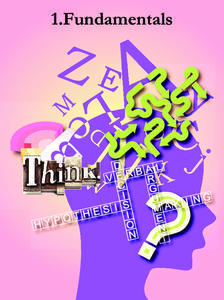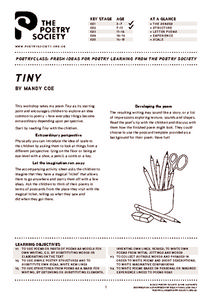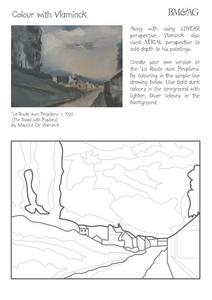Education Bureau of Hong Kong
Fundamentals
"Fundamentals," the first lesson in a series of eight, introduces the basic concepts and strategies covered in a series of resources designed to teach high schoolers critical thinking skills. The worksheets and activities in this first...
Missouri Department of Elementary
A Stranger Among Us
The final lesson in the R.E.S.PE.C.T series asks eighth graders to expand their vision beyond the walls of the classroom and to consider how they can promote acceptance and respect of others within in the global community. "A Stranger...
Teaching Tolerance
Using Photographs to Teach Social Justice | Exploring Identity
Even without captions, photographs can tell amazing, involved, and complex stories. Viewers analyze two photos, consider what the pictures reveal about the subjects' identity, and determine the social justice issues represented in the...
Thoughtful Learning
Using Perspective Shifting to Imagine History
Imagine what it would have been like to walk from Georgia to Texas! Perspective shifting, a key part of developing social awareness, involves just this sort of imaging. A short mini-lesson asks learners to shift their point of view and...
Thoughtful Learning
Using Perspective Shifting to Understand Others
Being able to see things from another's perspective is an important part of social awareness. A short activity permits scholars to practice perspective-taking, which in turn helps them develop empathy, appreciate diversity, and promote...
National Woman's History Museum
Tea with Penelope: A 2-Point Perspective of the Edenton Tea Party
A brief introduction to Penelope Barker sets the stage for a discussion about political cartoons and the persuasive technique used to create them. A graphic organizer aids scholars in the analysis of a piece of work using a 2-point...
EngageNY
End of Unit Assessment: Fishbowl Discussion, Part 1: Comparing Conflicting Accounts of the Pearl Harbor Attack
Scholars continue discussing Unbroken by using a fishbowl activity. Some readers share thoughts about the Day of Infamy, while others sit and observe the conversation. After the activity, pupils share what they learned.
Ashoka
A Toolkit for Promoting Empathy in Schools
Instill kindness with a unit all about empathy. Lessons and activities follow a prepare, engage, reflect, and action sequence. Learning experiences include making the classroom a safe environment, peer-invented handshakes, discussions...
Space Awareness
What is a Constellation
Why do some stars in a constellation appear brighter than others? Using a get-up-and-move astronomy activity, scholars explore perspective and the appearance of constellations in the sky while developing an understanding of the...
University of Pennsylvania
Decoding Propaganda: J’Accuse…! vs. J’Accuse…!
Reading snail mail is a great way to go back into history and to understand others' points of view. The resource, the second in a five-part unit, covers the Dreyfus Affair. Scholars, working in two different groups, read one letter and...
University of Pennsylvania
From the Dreyfus Affair to the World Today
Historical events do not occur in a vacuum. Such is the case of the Dreyfus Affair, where the connection between Captain Alfred Dreyfus, Emile Zola, and Hannah Arendt is fused by the events of the early 20th century. The informative...
University of Pennsylvania
Using Comic Strips to Teach Multiple Perspectives
Scholars view comics from two different perspectives; one paints the Alfred Dreyfus as innocent, while the other portrays the exact opposite. They solve the mystery of what happened by analyzing the source, working in groups, and...
University of Minnesota
Beautiful Brain: Brain Inspiration
"Neuroscientists consider Cajal as important to their discipline as Einstein is to physics." The first of four lessons has scholars view Santiago Ramon y Cajal's drawings of neurons. They reflect and respond to the art through writing...
K5 Learning
The Blind Men and the Elephant
Sometimes it's necessary to view the whole picture before making a judgment about a small part. Read a short story about five blind men who try to identify an elephant by feeling different parts and coming to their own conclusions....
Manchester College
What’s Your Point of View?
Work on deciphering the point of view of various pieces of literature. As readers review the concepts of first, second, and third person perspective, they apply what they know to different passages.
Growing Kids Ministry
Useless Junk? or Made with a Purpose?
Demonstrate that all items (and people) have a purpose in God's plan with a Sunday School assignment. After examining seemingly useless items, such as bolts, paper clips, or batteries, kids fill in the blanks to express the item's...
Macmillan Education
Changing Your Mindset
Why do some people achieve their goals and persevere despite the setbacks they face? This question is the focus of this life skills lesson, which includes worksheets, discussion, and collaborative activities on developing a growth mindset.
Macmillan Education
What Do You See?
Encourage learners to develop greater self-awareness and an understanding of perception versus reality. Here you'll find a life skills lesson that includes worksheets, discussion, and brainstorming activities on the topic of how we see...
Poetry Society
Tiny by Mandy Coe
Introduce magic and imagination into your classroom with a poetry activity. Learners read the poem "Tiny" by Mandy Coe and use their magic tickets to visit any place they can think of! The final result is a poem describing where they...
National Gallery of Canada
Mastering One-Point Perspective
Cover one-point perspective through observation and practice. Class members examine several works of art that use one-point perspective, look at magazine images to find the vanishing points and horizon lines, and draw their own city...
Curated OER
Art Basics Scavenger Hunt
Hand out this worksheet and lead your class on a scavenger hunt. Pupils look for examples of shape, form, balance, pattern, perspective, space, and depth. They draw and write about the examples they've found. A great resource to add to...
Media Smarts
Bias
See how bias operates firsthand. Half of the class reads one article while the other half reads another article on the same event. The obvious differences emerge when the two sides talk about their observations though. Several handouts...
Curated OER
Geography/Current Events Project
Using the Balkan region as an example, fourth graders review the five themes of geography as a class. They identify the physical and human characteristics of a region before labeling the countries and landforms on a map. They then...
Curated OER
Colour with Vlaminck
In this perspective worksheet, students view a painting by De Vlaminck. They create their own version of the painting by coloring an included line drawing. Students are challenged to use dark colors in the foreground and lighter, bluer...

























